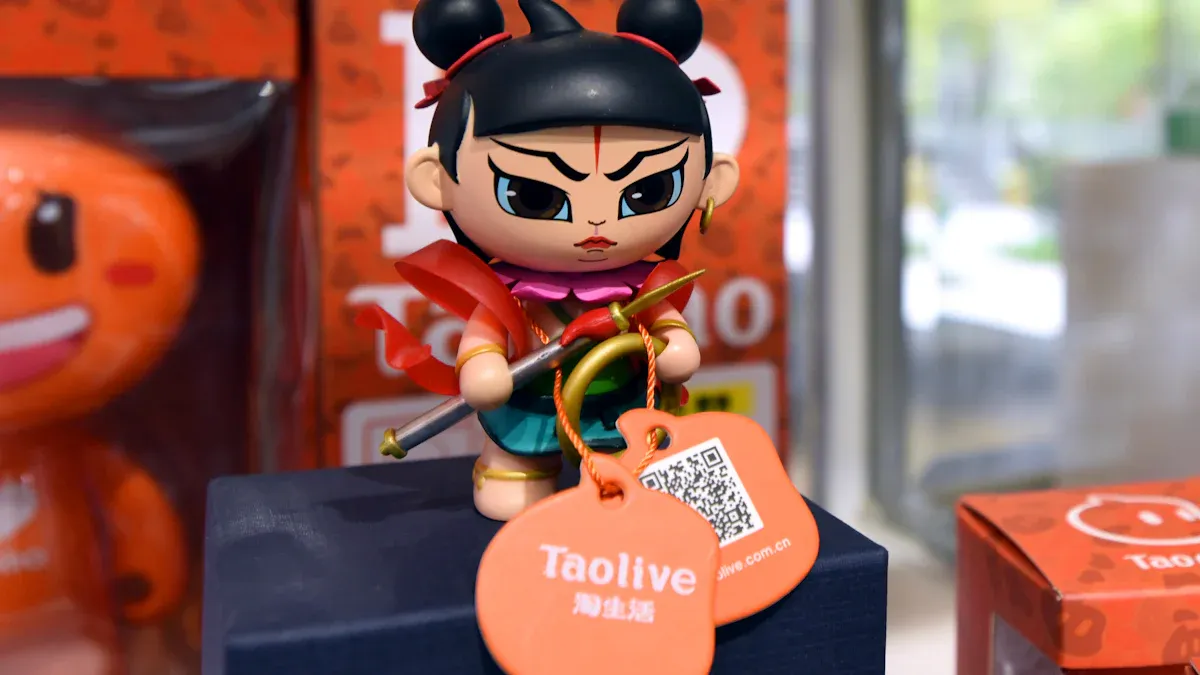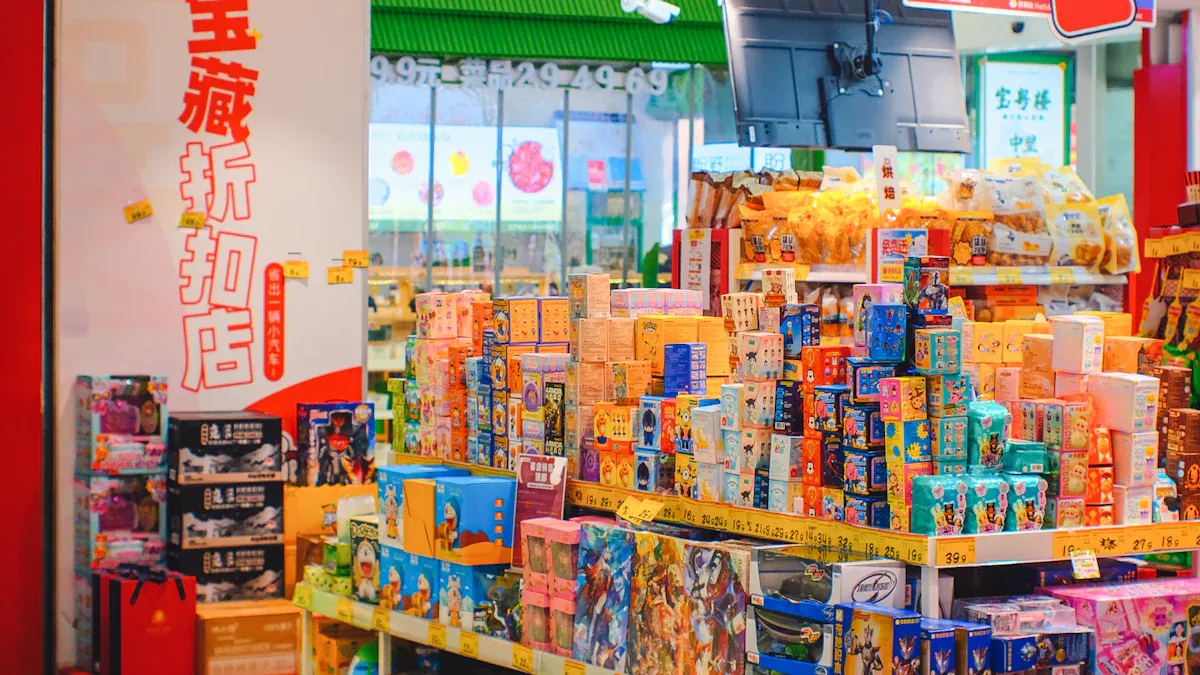- EasyCard
- Trade
- Help
- Announcement
- Academy
- SWIFT Code
- Iban Number
- Referral
- Customer Service
- Blog
- Creator
Taobao vs. Tmall: Which is Better

Image Source: unsplash
When shopping online in China, you often encounter Taobao and Tmall. The differences between Taobao and Tmall are significant. If you want affordable products, Taobao offers more choices; if you prioritize brands and guarantees, Tmall is more suitable. Which is better? There’s no one-size-fits-all answer. You need to decide based on your needs. Keep reading to find the platform that best suits you.
Key Points
- Taobao is an open marketplace with a wide variety of products at affordable prices, ideal for consumers seeking diversity and low costs.
- Tmall focuses on branded shopping, offering guaranteed product quality and standardized after-sales service, suitable for those prioritizing authenticity and shopping experience.
- Tmall sellers must have business credentials, and products are typically branded or authorized; Taobao has lower seller barriers, with many individual and small sellers.
- Tmall offers faster logistics and uniform after-sales processes, making disputes easier to resolve; Taobao’s logistics and after-sales vary by seller.
- When choosing a platform, consider your budget, quality needs, and shopping habits to flexibly select Taobao or Tmall for an enhanced shopping experience.
Differences Between Taobao and Tmall
Platform Positioning
When shopping online in China, you’ll notice distinct positioning between Taobao and Tmall. Taobao resembles a large marketplace where anyone can open a store, offering a diverse range of products. Tmall focuses on branded shopping, emphasizing authentic products and brand image. The table below provides a clearer view of Taobao and Tmall differences:
| Dimension | Taobao Positioning (Marketplace) | Tmall Positioning (Branded Shopping) |
|---|---|---|
| Seller Qualifications | No strict requirements, supports various legal products | Requires business credentials, products must be authentic or authorized brands |
| Product Types | All legal products allowed | Limited to authentic or authorized branded products |
| Revenue Source | Primarily advertising revenue | Primarily transaction commissions, with advertising as secondary |
| Operational Positioning | Marketplace for diverse sellers and products | Branded shopping, emphasizing brand and authenticity |
| IT Infrastructure | Supports multi-seller stores and guaranteed transactions, no significant difference | Same as Taobao but includes transaction commission functionality |
| Target Market | Broader consumers and sellers, focusing on diversity and openness | Niche high-end brand market, focusing on quality and brand image |
You can see that Taobao and Tmall differ not only in product types and seller qualifications but also in revenue models and target markets. Taobao is more open, ideal for those seeking variety. Tmall prioritizes brands and quality, suitable when you have high authenticity expectations.
Seller Types
On Taobao, you’ll encounter individual sellers, small studios, and entrepreneurs. The platform has low entry barriers, allowing legal products to be listed with minimal requirements. Tmall, however, only permits business sellers with valid business licenses, and products must be authentic or brand-authorized. Tmall features three store types: flagship stores, authorized stores, and specialty stores. When shopping on Tmall, you typically deal with well-known brands or large enterprises, enjoying higher service standards.
The difference in seller types is stark. Taobao suits individual entrepreneurs and small sellers with low barriers and diverse products. Tmall provides a platform for branded sellers, emphasizing brand image and service quality. If you trust brands, Tmall is your go-to. If you enjoy finding unique or budget-friendly items, Taobao is more suitable.
User Demographics
When choosing a platform, consider the differing user demographics. Tmall’s primary consumers are those born in the 1980s, 1990s, and 2000s. These users, with varied backgrounds, generally have strong purchasing power and prioritize brand and quality. Tmall’s average order value continues to grow, reflecting mature consumer behavior. You’ll notice Tmall’s brand marketing targets diverse, personalized needs of these groups.
Taobao’s user base is broader. While specific age and purchasing power data are unavailable, Taobao attracts a wide range of consumers through diverse products and flexible marketing. Whether you’re a student, professional, or homemaker, Taobao has something for you. The demographic difference lies in Tmall’s younger, wealthier users versus Taobao’s broader consumer reach across various income levels.
Tip: When choosing a platform, align your shopping needs and habits with the differences between Taobao and Tmall for a smarter decision.
Products and Pricing

Image Source: pexels
Product Quality
When shopping on Taobao or Tmall, product quality is a top concern. Tmall enforces strict quality standards. The platform uses a “double hundred rule” to score product information completeness and accuracy. Products with a base quality score below 60 face restricted search visibility, and severe violations may lead to delisting. Tmall also strictly addresses seller infringements and offers product certification. Shopping on Tmall makes it easier to buy high-quality, authentic products. Taobao offers a wide product range with varying quality. The platform uses a real experience score system, evaluating sellers on product quality, logistics speed, and service guarantees. Taobao restricts low-quality product visibility to encourage quality improvements, but due to lower entry barriers, you must carefully assess product quality.
Price Differences
On Taobao, you can find many budget-friendly products. With numerous sellers and fierce competition, prices vary widely, allowing you to buy desired items at lower costs. Tmall products are generally pricier due to its focus on mid-to-high-end branded goods from authorized sellers. Shopping on Tmall often involves paying a premium for brand value and service guarantees. For example, a standard T-shirt on Taobao may cost 10–30 USD (1 USD ≈ 7.2 CNY), while a similar branded T-shirt on Tmall typically ranges from 30–60 USD. Choose based on your budget and quality preferences.
Brand Guarantees
Shopping on Tmall offers robust brand guarantees. Sellers must have business credentials, and products must be authentic or authorized. Tmall has clear infringement policies to protect your rights and offers “7-day no-reason returns” for some products, with ongoing improvements to return standards. While Taobao has branded stores, individual and small sellers dominate, making brand guarantees less comprehensive. When shopping on Taobao, check store reputation and user reviews to select reliable sellers. If authenticity and after-sales matter most, Tmall is the better choice.
After-Sales Service
After-Sales Policies
Shopping on Tmall provides standardized after-sales policies. All sellers must offer “7-day no-reason returns,” with clear processes for returns, exchanges, repairs, and complaints. You can initiate requests via the order page, and Tmall follows up automatically. Taobao’s after-sales policies vary by seller. Some offer “7-day no-reason returns,” but not all. Check the product page’s after-sales details carefully. Taobao enforces basic service requirements, but the experience depends on seller integrity and responsiveness.
Tip: Before ordering, prioritize shops offering “7-day no-reason returns” for greater assurance.
Dispute Resolution Experience
On Tmall, if you encounter after-sales issues, you can file a complaint via platform customer service, which intervenes to protect your rights. Tmall strictly evaluates sellers, penalizing violations. On Taobao, you first negotiate with the seller. If unresolved, you can escalate to Taobao’s customer service, which reviews transaction records and evidence. Due to Taobao’s diverse seller base, dispute experiences vary—some sellers resolve issues promptly, others may delay.
Tmall offers faster responses and clearer dispute resolution processes. On Taobao, keep detailed communication records and evidence for effective dispute resolution.
Refunds and Returns
Tmall’s refund and return process is uniform. Sellers must process requests within a set timeframe, with most products supporting “7-day no-reason returns.” After seller approval, you can return the item and receive a refund to your original payment method, such as a Hong Kong bank credit card, based on the paid USD amount (1 USD ≈ 7.2 CNY).
Taobao’s refund and return process varies by seller. You negotiate return details, and while some sellers are efficient, others may delay. Taobao intervenes in disputes, but the process is less standardized. Choose high-reputation Taobao shops and communicate promptly with the platform if issues arise.
Summary: Tmall offers more reliable, streamlined after-sales service. Taobao’s after-sales experience varies by seller. Choose based on your needs and shopping habits.
Shopping Experience

Image Source: pexels
Logistics Service
Logistics experiences differ between Taobao and Tmall. Tmall sellers often use official partner logistics, ensuring fast shipping and reliable delivery, typically within 1–3 days. Taobao’s diverse seller base means some small sellers use cheaper logistics, leading to variable delivery speeds and service quality. On Taobao, prioritize “official logistics” or high-rated shops for a better delivery experience.
Tip: Check logistics options and estimated delivery times before ordering to plan receipt effectively.
Promotional Activities
Tmall hosts major promotional events like “Double 11” and “618,” with clear rules, significant discounts, and perks like coupons or bundle deals for branded products. Taobao’s promotions are more flexible, including platform-wide events and shop-specific offers like flash sales or exclusive coupons. Choose the platform and timing based on your needs to maximize savings.
| Platform | Major Events | Promotion Types |
|---|---|---|
| Tmall | Double 11, 618, etc. | Bundle discounts, brand coupons |
| Taobao | Flash sales, coupons, etc. | Shop-specific promotions |
User Reviews
Both Taobao and Tmall allow you to view user reviews after purchase. Tmall’s review system is stricter, monitoring fake reviews to ensure authenticity, with feedback often reflecting branded product experiences. Taobao has more reviews with richer content, but some small sellers may engage in fake reviews. On Taobao, focus on high-reputation shops and reviews with photos or videos for better quality assessment.
Suggestion: Prioritize recent reviews and those with photos to make informed purchasing decisions.
Choosing Recommendations
Prioritizing Quality
If you value product quality and brand guarantees, Tmall is the better choice. Its strict seller vetting ensures business credentials and authentic or authorized products. Shopping on Tmall, such as buying a branded phone, offers official warranties and “7-day no-reason returns,” with prices typically ranging from 500–800 USD (1 USD ≈ 7.2 CNY). Tmall suits those prioritizing quality and a hassle-free experience.
Tip: On Tmall, choose flagship stores and check product certifications and reviews for added confidence.
Prioritizing Price
If affordability and product variety matter most, consider Taobao. Its numerous sellers and competitive market offer wide price ranges, letting you find deals like a T-shirt for 10–30 USD (1 USD ≈ 7.2 CNY). Mitigate risks by selecting high-rated shops and checking authentic buyer reviews. Taobao is ideal for budget-conscious shoppers or those exploring diverse styles.
- Taobao Shopping Tips:
- Choose high-rated shops.
- Refer to reviews with photos.
- Check after-sales policies to protect your rights.
Other Needs
You may have additional needs, like fast delivery or promotions. For quick delivery, select shops with official logistics on either platform. Both Tmall and Taobao offer rich promotional activities. Payments via Hong Kong bank credit cards are settled in USD (1 USD ≈ 7.2 CNY), with refunds returned the same way. Choose based on delivery timing, payment preferences, and promotional interests.
| Need Type | Recommended Platform | Description |
|---|---|---|
| Brand Guarantees | Tmall | Business sellers, authentic products, standardized after-sales |
| Affordability | Taobao | Diverse products, wide price range |
| Fast Delivery | Tmall/Taobao | Choose shops with official logistics |
| Promotional Offers | Tmall/Taobao | Follow major platform events or shop-specific promotions |
Suggestion: Combine your shopping habits and needs to choose Taobao or Tmall for an optimal experience.
You now understand the differences between Taobao and Tmall. There’s no definitive answer to which platform is better for shopping in China. Decide based on your habits and needs. Tmall suits those prioritizing brands and quality, while Taobao appeals to those seeking variety and affordability. Make a rational choice based on your situation.
FAQ
Why do Taobao and Tmall have such different product prices?
Taobao offers more budget-friendly products due to its diverse seller base. Tmall sellers, often brand owners, target mid-to-high-end markets, with prices reflecting brand premiums and service guarantees. At 1 USD ≈ 7.2 CNY, Tmall prices are generally higher.
Choose based on your budget and needs.
Is the refund process complicated when paying with a Hong Kong bank credit card?
Refunds on Taobao or Tmall are returned to your Hong Kong bank credit card, settled in USD (1 USD ≈ 7.2 CNY). No extra steps are needed, with refunds typically processed within 3–7 business days.
Do both Taobao and Tmall support “7-day no-reason returns”?
Tmall mandates “7-day no-reason returns” for all products. On Taobao, this varies by seller. Check product page details before ordering and prioritize shops offering this service for added assurance.
Is there a difference in logistics speed between Taobao and Tmall?
Tmall sellers often use official partner logistics, ensuring fast and reliable delivery. Taobao’s logistics vary by seller, with some using slower, cheaper services. Choose official logistics or high-rated shops for a better experience.
Which is better for buying branded products?
Tmall is better for branded products, requiring sellers to have business credentials and authentic or authorized goods. It offers robust after-sales and brand services for a more reliable experience.
Both Taobao and Tmall offer great convenience for your online shopping. However, when you engage in cross-border shopping, such as paying for international shipping, processing refunds, or making large purchases, you might encounter challenges like exchange rate fluctuations, high transaction fees, and complex payment processes. These financial hurdles can affect your overall shopping experience.
BiyaPay offers a seamless solution to these cross-border financial challenges, making your Taobao and Tmall shopping experience hassle-free. Our platform supports flexible conversions between various fiat and digital currencies and provides real-time exchange rate inquiries, ensuring you get the best rates when paying for international shipping or making large purchases. With a simple registration, you can benefit from our ultra-low transaction fees, starting from just 0.5%, and transfer funds quickly to most countries and regions worldwide, with transfers often completed on the same day. Choose BiyaPay to make your cross-border payments as simple as a local transfer, so you can focus on the joy of shopping rather than on complex financial procedures.
*This article is provided for general information purposes and does not constitute legal, tax or other professional advice from BiyaPay or its subsidiaries and its affiliates, and it is not intended as a substitute for obtaining advice from a financial advisor or any other professional.
We make no representations, warranties or warranties, express or implied, as to the accuracy, completeness or timeliness of the contents of this publication.




Contact Us
Company and Team
BiyaPay Products
Customer Services
is a broker-dealer registered with the U.S. Securities and Exchange Commission (SEC) (No.: 802-127417), member of the Financial Industry Regulatory Authority (FINRA) (CRD: 325027), member of the Securities Investor Protection Corporation (SIPC), and regulated by FINRA and SEC.
registered with the US Financial Crimes Enforcement Network (FinCEN), as a Money Services Business (MSB), registration number: 31000218637349, and regulated by FinCEN.
registered as Financial Service Provider (FSP number: FSP1007221) in New Zealand, and is a member of the Financial Dispute Resolution Scheme, a New Zealand independent dispute resolution service provider.



















